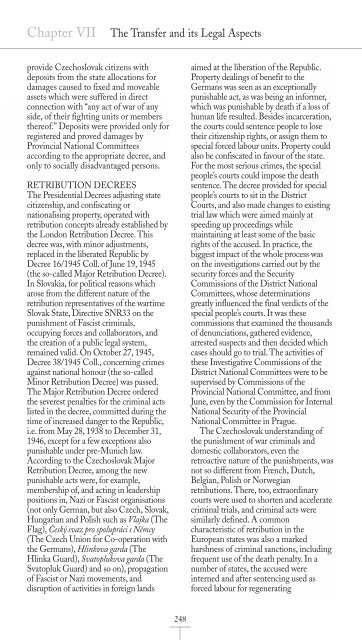the nationality of all inhabitants of the czech provinces and ...
the nationality of all inhabitants of the czech provinces and ...
the nationality of all inhabitants of the czech provinces and ...
You also want an ePaper? Increase the reach of your titles
YUMPU automatically turns print PDFs into web optimized ePapers that Google loves.
Chapter VII The Transfer <strong>and</strong> its Legal Aspects<br />
provide Czechoslovak citizens with<br />
deposits from <strong>the</strong> state <strong>all</strong>ocations for<br />
damages caused to fixed <strong>and</strong> moveable<br />
assets which were suffered in direct<br />
connection with “any act <strong>of</strong> war <strong>of</strong> any<br />
side, <strong>of</strong> <strong>the</strong>ir fighting units or members<br />
<strong>the</strong>re<strong>of</strong>.” Deposits were provided only for<br />
registered <strong>and</strong> proved damages by<br />
Provincial National Committees<br />
according to <strong>the</strong> appropriate decree, <strong>and</strong><br />
only to soci<strong>all</strong>y disadvantaged persons.<br />
RETRIBUTION DECREES<br />
The Presidential Decrees adjusting state<br />
citizenship, <strong>and</strong> confiscating or<br />
nationalising property, operated with<br />
retribution concepts already established by<br />
<strong>the</strong> London Retribution Decree. This<br />
decree was, with minor adjustments,<br />
replaced in <strong>the</strong> liberated Republic by<br />
Decree 16/1945 Coll. <strong>of</strong> June 19, 1945<br />
(<strong>the</strong> so-c<strong>all</strong>ed Major Retribution Decree).<br />
In Slovakia, for political reasons which<br />
arose from <strong>the</strong> different nature <strong>of</strong> <strong>the</strong><br />
retribution representatives <strong>of</strong> <strong>the</strong> wartime<br />
Slovak State, Directive SNR33 on <strong>the</strong><br />
punishment <strong>of</strong> Fascist criminals,<br />
occupying forces <strong>and</strong> collaborators, <strong>and</strong><br />
<strong>the</strong> creation <strong>of</strong> a public legal system,<br />
remained valid. On October 27, 1945,<br />
Decree 38/1945 Coll., concerning crimes<br />
against national honour (<strong>the</strong> so-c<strong>all</strong>ed<br />
Minor Retribution Decree) was passed.<br />
The Major Retribution Decree ordered<br />
<strong>the</strong> severest penalties for <strong>the</strong> criminal acts<br />
listed in <strong>the</strong> decree, committed during <strong>the</strong><br />
time <strong>of</strong> increased danger to <strong>the</strong> Republic,<br />
i.e. from May 28, 1938 to December 31,<br />
1946, except for a few exceptions also<br />
punishable under pre-Munich law.<br />
According to <strong>the</strong> Czechoslovak Major<br />
Retribution Decree, among <strong>the</strong> new<br />
punishable acts were, for example,<br />
membership <strong>of</strong>, <strong>and</strong> acting in leadership<br />
positions in, Nazi or Fascist organisations<br />
(not only German, but also Czech, Slovak,<br />
Hungarian <strong>and</strong> Polish such as Vlajka (The<br />
Flag), Český svaz pro spolupráci s Němcy<br />
(The Czech Union for Co-operation with<br />
<strong>the</strong> Germans), Hlinkova garda (The<br />
Hlinka Guard), Svatoplukova garda (The<br />
Svatopluk Guard) <strong>and</strong> so on), propagation<br />
<strong>of</strong> Fascist or Nazi movements, <strong>and</strong><br />
disruption <strong>of</strong> activities in foreign l<strong>and</strong>s<br />
248<br />
aimed at <strong>the</strong> liberation <strong>of</strong> <strong>the</strong> Republic.<br />
Property dealings <strong>of</strong> benefit to <strong>the</strong><br />
Germans was seen as an exception<strong>all</strong>y<br />
punishable act, as was being an informer,<br />
which was punishable by death if a loss <strong>of</strong><br />
human life resulted. Besides incarceration,<br />
<strong>the</strong> courts could sentence people to lose<br />
<strong>the</strong>ir citizenship rights, or assign <strong>the</strong>m to<br />
special forced labour units. Property could<br />
also be confiscated in favour <strong>of</strong> <strong>the</strong> state.<br />
For <strong>the</strong> most serious crimes, <strong>the</strong> special<br />
people’s courts could impose <strong>the</strong> death<br />
sentence. The decree provided for special<br />
people’s courts to sit in <strong>the</strong> District<br />
Courts, <strong>and</strong> also made changes to existing<br />
trial law which were aimed mainly at<br />
speeding up proceedings while<br />
maintaining at least some <strong>of</strong> <strong>the</strong> basic<br />
rights <strong>of</strong> <strong>the</strong> accused. In practice, <strong>the</strong><br />
biggest impact <strong>of</strong> <strong>the</strong> whole process was<br />
on <strong>the</strong> investigations carried out by <strong>the</strong><br />
security forces <strong>and</strong> <strong>the</strong> Security<br />
Commissions <strong>of</strong> <strong>the</strong> District National<br />
Committees, whose determinations<br />
greatly influenced <strong>the</strong> final verdicts <strong>of</strong> <strong>the</strong><br />
special people’s courts. It was <strong>the</strong>se<br />
commissions that examined <strong>the</strong> thous<strong>and</strong>s<br />
<strong>of</strong> denunciations, ga<strong>the</strong>red evidence,<br />
arrested suspects <strong>and</strong> <strong>the</strong>n decided which<br />
cases should go to trial. The activities <strong>of</strong><br />
<strong>the</strong>se Investigative Commissions <strong>of</strong> <strong>the</strong><br />
District National Committees were to be<br />
supervised by Commissions <strong>of</strong> <strong>the</strong><br />
Provincial National Committee, <strong>and</strong> from<br />
June, even by <strong>the</strong> Commission for Internal<br />
National Security <strong>of</strong> <strong>the</strong> Provincial<br />
National Committee in Prague.<br />
The Czechoslovak underst<strong>and</strong>ing <strong>of</strong><br />
<strong>the</strong> punishment <strong>of</strong> war criminals <strong>and</strong><br />
domestic collaborators, even <strong>the</strong><br />
retroactive nature <strong>of</strong> <strong>the</strong> punishments, was<br />
not so different from French, Dutch,<br />
Belgian, Polish or Norwegian<br />
retributions. There, too, extraordinary<br />
courts were used to shorten <strong>and</strong> accelerate<br />
criminal trials, <strong>and</strong> criminal acts were<br />
similarly defined. A common<br />
characteristic <strong>of</strong> retribution in <strong>the</strong><br />
European states was also a marked<br />
harshness <strong>of</strong> criminal sanctions, including<br />
frequent use <strong>of</strong> <strong>the</strong> death penalty. In a<br />
number <strong>of</strong> states, <strong>the</strong> accused were<br />
interned <strong>and</strong> after sentencing used as<br />
forced labour for regenerating


